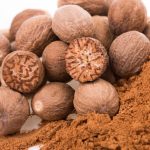 When the word nutmeg entered English at the end of the fourteenth century, about the time that Chaucer was writing The Canterbury Tales, it was spelt notemugge. The medieval form of this spice’s name had been derived from the French nois muguede, which had in turn developed from, the Late Latin nuce muscata, meaning musky nut, in reference to its smell. In English, the “nutty” origin of the word is still evident in its modern form, nutmeg, but its “musky” ancestry has been obscured beyond recognition; the opposite occurred in French, where the “musky” origin of the word is still evident in the modern form, muscade, but the “nutty” component has been lopped off.
When the word nutmeg entered English at the end of the fourteenth century, about the time that Chaucer was writing The Canterbury Tales, it was spelt notemugge. The medieval form of this spice’s name had been derived from the French nois muguede, which had in turn developed from, the Late Latin nuce muscata, meaning musky nut, in reference to its smell. In English, the “nutty” origin of the word is still evident in its modern form, nutmeg, but its “musky” ancestry has been obscured beyond recognition; the opposite occurred in French, where the “musky” origin of the word is still evident in the modern form, muscade, but the “nutty” component has been lopped off.
The ovate, greenish-brown kernel that lies within the fruit of a lush, evergreen tree indigenous to the East Indies, comparable in size to the tip of a thumb, is known as a seed or kernel of nutmeg. Typically, nutmeg is ground when sold, although unprocessed kernels can be purchased for personal use. Its flavor is sharp and piquant, making it a great complement to the concealed tastes of fruits and vegetables. When combined with cinnamon, cloves, and ginger, it is frequently utilized in baked goods such as cakes and cookies, as well as in dairy-based treats like eggnog and custard. Mace and nutmeg are mostly interchangeable, though mace has a stronger scent.
Originating from towering evergreen trees found in various tropical regions, the seed of profound significance emerges. Encased within a fruit that delicately splits upon ripening, a solitary seed is unveiled, enveloped by a husk recognized as mace once dried. Upon achieving dryness, the seeds undergo an intricate process, as they are carefully opened to reveal the coveted treasure within – the light brown kernels commonly known as nutmeg. These kernels hold immense value, with the smaller ones utilized for extracting their prized oil, renowned as nutmeg butter or oil of mace. Meanwhile, the larger specimens remain intact, destined for global markets as whole nutmeg, preserving their authentic essence. While ground nutmeg enjoys wider popularity, discerning individuals prefer procuring whole nutmeg and grating it as needed, as the full-bodied flavor remains unparalleled in its unadulterated form.
